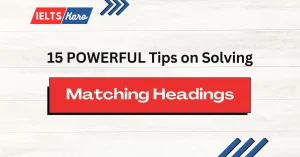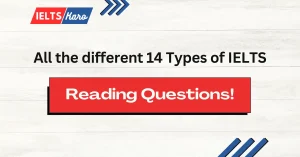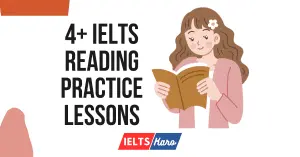10 Powerful IELTS Reading Tips to Improve your Score
With an 8.5 in Reading (that’s a 39/40), I am going to share some valuable IELTS Reading tips that will dramatically help you in improving your IELTS Reading Test scores. This sums up my ENTIRE years of experience of helping students prepare for the IELTS Reading.
I see many students saying that despite repeat practice attempts at home and in the test, they barely manage to get past a 6 or a 6.5. And don’t get me wrong though. Practice is vital, but even more important is to learn HOW to practice for this module.
Reading is by far one of the most challenging modules where you have to answer 40 questions in 60 minutes after reading long passages. But how EXACTLY do you answer these questions?
I am sharing these tips that I personally used to get this band score. From developing IELTS reading exam skills and improving your English level, you need to work on improving your reading habits. This means that even if you are a native speaker, you still need to know on attempting the entire reading exam under timed-conditions by knowing its format.
IELTS Reading Tips: How to Increase your Band Score?
Here are my personally implemented tips that I have gained after rigorous practice and a high band score:
1. You have to Master All 14 Types of IELTS Reading Questions
There are a total of 14 different types of IELTS reading questions, but at any given time, not all types are covered in the 40 questions. This means, you got to work on perfecting your skills at each one of the question types.
Understand that all 14 are further divided into 2 categories:
- Answers following a logical order
- Answers NOT following a logical order
The questions that come in the logical order are:
- True False Not Given
- Sentence Completion
- Summary Completion
- Flowchart Completion
- Table Completion
- Note Completion
- MCQs
Feel free to click the link on any one of the question types to know more about these questions and their practice sessions.
2. Skimming and Scanning Reading Skills
You need to skim and scan passages, a strategy that comes with patience, persistence and practice. Skimming allows you to get a good idea of the content. Don’t focus too much on trying to understand the meaning of every sentence.
Instead, take no more than 3 minutes to read the full passage. Then, as you read, underline the keywords. But what are the keywords, you’d ask?
The keywords that you need to look for and highlight are Names, Numbers, Dates, Months, Abbreviation and so on. Once you skim and highlight the keywords, you should be in a position to scan the content and locate the information after reading the question.
3. Develop your speed reading skills.
IELTS tests your time management ability pushing you outside of your comfort zone. Your job? You MUST be able to develop speed reading skills for all three passages.
Instead of reading the entire passage word-by-word and trying to figure out their meaning, you’d already run out of time by mid exam. Your focus should be to locate the right information, solve the question, and move on. Keep an eye on the clock as well.
4. Don’t try to understand the full passage
Even though IELTS is an English comprehension exam, it DOES NOT test your understanding of the passage. Your job as a candidate should be to only locate information and do all questions within 45 to 50 minutes, giving you spare time to review all your answers.
The only two types of questions that would consume most of your time are Matching Headings and Choosing a title.
For this, you need to make sure that you are done with other questions types that come in an order as they are less-time consuming than Matching Headings.
5. Develop Your Vocabulary
Vocabulary does not mean to cram in as many words with meanings as possible.
Vocabulary is defined as the ability to understand a word, know its meaning, and then have the ability to know when to use it and when not to. Instead of forcing a word in an essay that doesn’t make sense, it is better to use a more simplistic language.
I remember back in my high school days, our Professor, Mr. Gary Bletsch would assign us a vocabulary quiz each week. Consisting of 99 marks, there were 33 questions, each carrying 3 marks.
11 Fill in the Blanks in Sentences, 11 Words that need to be defined with their meanings, 11 Words that you need to use in your own sentence with the right collocations and matching nouns.
We as students were tasked with only ONE activity; i.e. read the short stories and novels, underline the keywords, find their meanings and learn to use them in sentences. This is exactly the essence of the IELTS vocabulary.
I do not have a magical formula where I assign you a random list of words with their meanings and ask you to memorize them all. The IELTS Reading test just doesn’t work this way.
6. Find Keywords
Each IELTS reading question will have keywords to help you locate the information in the passage and to spot the right answer.
You should learn to spot keywords and use them correctly. You should also check whether the keywords can be paraphrased. You will soon learn to use keywords correctly when you review your answers in practice reading lessons. Some keywords are obvious, for instance names, dates, numbers, places etc. Other keywords are more subtle.
7. Grammar
Question types such as summary completion and sentence completion require that the sentence is grammatically correct when you have put the answer in. This means that grammar can help you to spot the right answer. Many students post question on this blog asking me why one answer is correct and the other is not – the reason is often grammar related. You will see this when you do practice reading lessons.
8. Keep Practicing
Without practice, you cannot improve your band scores. Only use the following sources for authentic test practice:
Cambridge IELTS Prep
IELTS Test Books
9. Read Books and Articles
The more you practice reading, the better your reading skills will be. Read articles on BBC News, Sky News, Dawn, Express Tribune, Economist, or any favorite novel that you like.
10. Improve Your Overall English Fluency
If the base of a building is not strong, it cannot hold multiple floors above it. Same is the case with your English language. Trying to cram in as many words and doing practice tests as possible to get a band score of 7 or above is not possible if your level of English is weak or just basic. Let’s be realistic here.
There are no shortcuts, and there will never be. The more you run away from practice tests, the harder it will become for you to master your reading skills.
Confused? Need more information? Hit me up at [email protected] and I will get back to you within 24 to 48 hours answering your questions.





